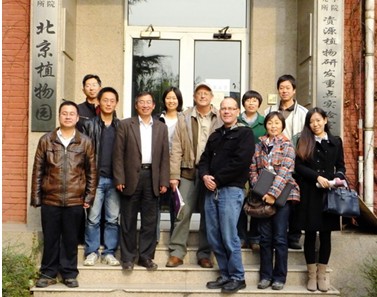A four-member U.S. delegation of biological control technology on specialty crops (flowers) visited Institute of Botany, CAS on November 13. The members include Professor Gary W. Knox (University of Florida), Professor David Creech (Stephen F. Austin State University), Associate Professor Yan Chen (Louisiana State University) and Dr. Mengmeng Gu (Texas A & M University). Professor Liangsheng Wang, the deputy director of Beijing Botanical Garden, Institute of Botany, Chinese Academy of Sciences(IB-CAS) hosted the meeting.
Dr. Xiaodong Li from Beijing Botanical Garden presented a talk entitled "Conservation status of plant resources in Beijing Botanical Garden, IB-CAS".The delegation is very interested in it and exchanged views extensively on woody plant collection, flower breeding, pest biological control, and so on. Both sides expressed their willingness to cooperate, and hoped to promote mutual exchanges and cooperation in related fields such as plant resources. They also set two directions for cooperation: (1) short-term student exchange program; (2) collaborative research on the crape myrtle, magnolia, blueberries, hosta and other taxa of common concern.
The delegation paid a short visit to display areas of the Garden after the meeting, including the Perennial Garden, the Fagaceae Area, the Fraxinus Area, the Syringa Area, the Crape Myrtle Garden and the Gymnosperm Area.

A four-member U.S. delegation of biological control technology on specialty crops (flowers) visited Institute of Botany, CAS on November 13. The members include Professor Gary W. Knox (University of Florida), Professor David Creech (Stephen F. Austin State University), Associate Professor Yan Chen (Louisiana State University) and Dr. Mengmeng Gu (Texas A & M University). Professor Liangsheng Wang, the deputy director of Beijing Botanical Garden, Institute of Botany, Chinese Academy of Sciences(IB-CAS) hosted the meeting.
Dr. Xiaodong Li from Beijing Botanical Garden presented a talk entitled "Conservation status of plant resources in Beijing Botanical Garden, IB-CAS".The delegation is very interested in it and exchanged views extensively on woody plant collection, flower breeding, pest biological control, and so on. Both sides expressed their willingness to cooperate, and hoped to promote mutual exchanges and cooperation in related fields such as plant resources. They also set two directions for cooperation: (1) short-term student exchange program; (2) collaborative research on the crape myrtle, magnolia, blueberries, hosta and other taxa of common concern.
The delegation paid a short visit to display areas of the Garden after the meeting, including the Perennial Garden, the Fagaceae Area, the Fraxinus Area, the Syringa Area, the Crape Myrtle Garden and the Gymnosperm Area.

